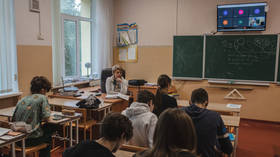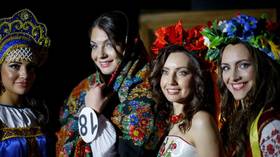Kiev introduces new restrictions on the Russian language

The Kiev City Council voted to remove the Russian language from the Ukrainian capital’s public school curriculum on Thursday, citing national security concerns.
According to the statement on the council’s website, the ban also covers nursery schools.
Vadim Vasilchuk, the chair of the council’s commission on education, said the measure “will prevent an escalation of tensions in society and strengthen the protection of the education space in Kiev from the hybrid activities of the enemy state.”
“Language matters, and, in a time of war, it is an issue of national security,” Vasilchuk added. The legislator said all classes would be taught in Ukrainian, the country’s sole state language.
The move came after Alexey Danilov, the head of Ukraine’s National Security and Defense Council, described the Russian language last month as “an element of enemy propaganda” that “must completely disappear from Ukrainian territory.”
In August, Ukraine’s Education Ministry said that nearly all works of Russian and Belarusian authors would be removed from literature classes.
Ukrainian activists and officials have also been tearing down monuments to Alexander Pushkin, Russia’s national poet and novelist, who lived in the 19th century. A bronze Pushkin bust was removed from its pedestal in the northern city of Zhitomir on Friday, while a monument in Kiev was taken down last month.
The rights of the sizable Russian-speaking minority have been a highly contentious issue ever since Ukraine gained independence from the Soviet Union in 1991.
The Donetsk and Lugansk regions broke away from Ukraine in 2014, following the coup in Kiev and in the wake of attempts by Ukrainian officials to restrict the use of Russian in public life. They formed the Donetsk (DPR) and Lugansk People's Republics (LPR).
Ukraine eventually adopted a set of laws that severely limit the use of Russian in public services, media, and education.
Moscow repeatedly accused Ukraine of discriminating against Russian speakers. In the days leading up to the Russian military operation in Ukraine that was launched in February, President Vladimir Putin said that the Ukrainian authorities were conducting policies of “derussification and forced assimilation.”
The DPR and LPR, together with two other former Ukrainian territories, joined Russia after holding referendums in late September.













